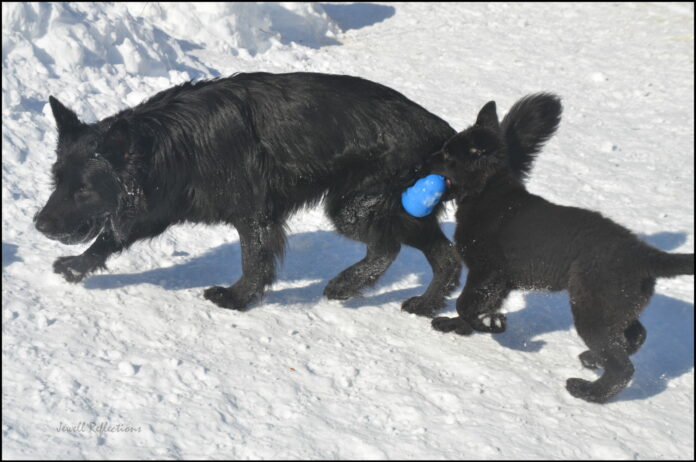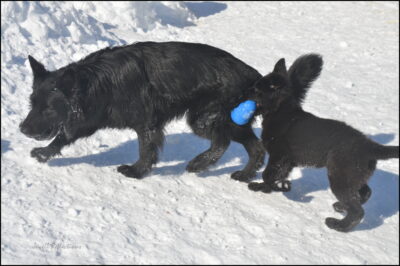
By Fran Jewell

Many people still question whether dogs learn from each other or not. Over and over I have seen dogs learn both good and bad from other dogs.
About seven years ago, I had a puppy here for training as a service dog. His name was Rainier. Rainier came here from Washington State with his breeder, Sharon.
At that time, all of my dogs would ring a bell to tell me they had to go out. As we were visiting in the living room that night, one of my older dogs went over to the door and rang the bell. Rainier just happened to be watching him as he rang the bell. Within seconds, Rainier went over and did exactly what my older dog did! Immediately I jumped up, said, “YES!” and opened the door for Rainier to go out. I followed him out the door and gave him a treat when he did go potty. From that day forward, NEVER did Rainier go potty in the house. Rainier was only 10 weeks old at the time.
I think a confident, older dog can be a great mentor for puppies. For the most part, they are fair and will discipline a puppy when needed, but even more so, they teach the puppy that there is no reason to bark at such and such. Or even, going in the car is great fun!
On the same hand, an unruly older dog can also teach those bad behaviors to youngsters. A dog that is fear aggressive can pass those behaviors on to a puppy. An unruly older dog can teach bad greeting habits, jumping, growling, digging, etc.
Shepherds that use dogs for herding sheep, cattle or even ducks and other livestock always place the young puppies in with the experienced herding dog. They learn from watching, then practice what they see.
By the same token, a fearful or anxious puppy can be comforted by an older, confident dog. This can also be true for adults. If one adult dog is fearful, a confident adult mentor dog can help greatly in teaching the fearful dog that there is no need for the fear.
While most fearful behavior is genetic, according to new studies, a calm, confident mentor dog can be a great influence and make things much better.
I am not suggesting that you run out and get two dogs! You must also remember that while you look different, you are still a pack member to a dog. If you are nervous, you can mentor that to your singleton dog or puppy. If you are calm and act as a leader for a fearful dog, you can mentor a sense of comfort to your dog as a leader.
Mentoring can be either positively meaningful or dreadful in terms of helping another dog. The important thing to remember is that dogs learn from those around them and you can use that to your advantage, or be aware of the disadvantage.
Fran Jewell is an IAABC Certified Dog Behavior Consultant, NADOI Certified Instructor and the owner of Positive Puppy Dog Training, LLC in Sun Valley. For more information, visit positivepuppy.com or call 208-578-1565.
